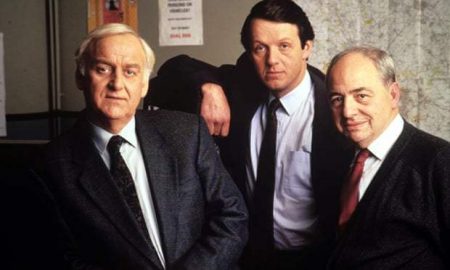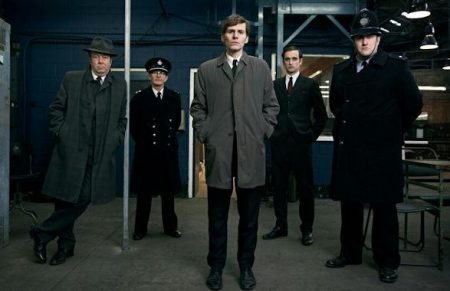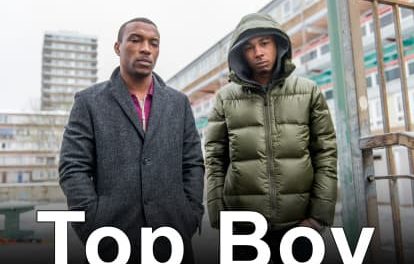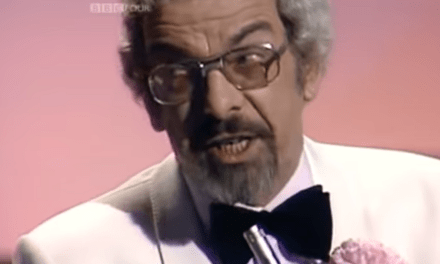Pithy title, eh? Oh, well; all will be revealed.
As part of my sabbatical I have recently re-watched and made extensive notes on every episode of Inspector Morse (ITV, 1987-2000). If I tell you why, I’ll have to take you down the cells. Suffice to say that this activity relates to a future publication.
Anyway, just as this (immensely pleasurable) screening marathon came to an end, the latest series of Endeavour (ITV, 2012- ) started up on Sunday evenings, giving me the opportunity to compare the two productions. When I’m not on sabbatical (sorry to rub it in, but it’s my first – and I am thoroughly enjoying myself, thank you), I teach my third years a little module called British TV Fictions, which is a ‘then and now’ of changes in (as the title suggest) UK-produced television drama and sitcom. For the final essay, students have to compare ‘old’ (no later than 1990) and ‘new’ (produced/originally broadcast within the last five years) texts deriving from the same format, i.e. a 1950s anthology play versus a modern single drama; old Corrie compared to the modern day version; ‘classic’ Doctor Who versus new; and so on. It’s the kind of assessment in which the student can really shine if they employ a little originality of thought and accuracy of analysis. The module is underpinned by John Ellis’s three eras of television (2000), and how the television climate has changed since scarcity, through availability, and up to the era of plenty (which I explain to the students as ‘more than we need’ – never a truer word spoken with regard to the current state of British television). However, students can look at any aspects of their chosen case studies that provide fruitful areas for analysis: production process and technology (e.g. the shift from multi-camera studio to single camera location for some – but not all – television fictions; and yes, I do make them read my book (2017)); aspect ratio (thank you, Sarah Cardwell (2014)); directing and performance style (my book again); social context; narrative content; narrative form; use of genre; use of multi-platform or transmedia content; you get the idea.
Comparing Inspector Morse and Endeavour would be something of a gift for an assignment like this, but to date only one student has attempted it. This was a couple of years ago and, to be honest, the results did little to feed my soul. Their conclusion was that nothing much had changed, really, when you look at it, because both programmes are series crime dramas made using single camera with a heavy reliance on Oxford locations. End of, as the young people probably say. There was no consideration of the extent to which, for its time, Inspector Morse was ground-breaking drama. Tapping into the heritage aesthetic established a few years earlier by Brideshead Revisited (ITV, 1981) (as Charlotte Brunsdon (1998) has observed), it reproduced many of the detective genre traits already present in the Colin Dexter novels from which they were (initially) adapted, while repurposing them into something the likes of which had arguably not been seen before on UK television screens. True, all the genre boxes were neatly ticked. In Morse we had a curmudgeonly yet brilliantly cerebral lead (whose improbable first name was not revealed until the penultimate episode), possessed of various character quirks of the type we have come to expect from our TV detectives; in Morse’s case, a love of classical music, The Times crossword and real ale. A misfit at work, Morse’s personal life was not so much disastrous as non-existent. If he exhibited any form of attraction towards a female in the episode, she would inevitably turn out to be either the victim, the killer, an accomplice, or simply not worth the emotional investment. I have a feeling that The Mary Whitehouse Experience (BBC, 1990-1992) once parodied this latter aspect in a sketch called Inspector Morose (‘Cheer up sir – you nearly pulled last week’), but sadly I have been unable to locate any such clip on the YouTube, and it is entirely possible that I dreamt it. In time-honoured fashion, Morse’s sidekick, Lewis, was trusty but nowhere near as bright (think Watson, Hastings, and so forth), though he could be relied upon to make a banal yet vital observation that would provide Morse with the clue required to turn the case on its head and bring the killer to justice (“You’ve done it again, Lewis!”; of course he has). There was also an irascible pathologist, Max, who was written out in series three to bring in potential love interest Doctor Grayling Russell (it didn’t work out, obviously), and a grumpy boss, Chief Superintendent Strange (Dexter always gave authority figures daft names), who was frequently at the end of his tether with his unconventional subordinate (‘You’re off this case, matey!”). There were also Hitchcock-like cameos from Dexter himself, who invariably stared directly into the camera whether playing an Oxford don or a pub extra.
It sounds like a somewhat predictable identikit crime drama, but the series managed seamlessly to transcend these potential limitations, not least due to the inspired casting of John The Sweeney Thaw (‘Shut it!’), who in Morse was playing an entirely different kind of TV ’tec from hard man Jack Regan, and the chemistry he shared with Kevin Whately’s Lewis, the latter actor spreading his wings to provide an increasingly nuanced performance after two series as nice but naive Neville in Auf Wiedersehen, Pet (ITV, 1983-86). The Oxford locations and Barrington Pheloung score helped, of course, as did the fact that actors of James Grout and Peter Woodthorpe’s calibre were drafted in as Strange and Max.
What arguably set the series apart from previous UK TV crime drama was its languid pace and elegiac tone. There was seldom much dashing around (and never any fisticuffs with villains), though Morse did drive a nice Jaguar that could probably have gone quite fast, if he’d wanted. This sedate tempo was facilitated by the fact that each episode lasted not one hour (including ad breaks), as was the norm, but two. It is easy to forget how innovative this was today, when the 8 to 10 pm slot is typically filled by the likes of Midsomer Murders (ITV, 1997- ) and Vera (ITV, 2011- ). In this respect, Morse felt like something new, and went on to win a slew of awards (including no fewer than three Best Actor BAFTAs for John Thaw), achieving viewing figures of 18 million in the process. This was no mean feat, even in the eras of scarcity and availability, when people actually still watched broadcast TV – even the ones with VCRs.
Alas, my former student did not pick up on any of this. Worse still, they claimed that Endeavour was simply more of the same.
Sigh.
I will now endeavour (sorry) to highlight a few of the differences between the two shows that would have provided me with a more satisfying read, and gained my student’s essay a more respectable mark.
Now, Endeavour is made in the era of plenty. I’m sure you all know what this means, and after three months of me banging on about it, so should the students. The fragmentation of audiences due to an ever-increasing number of channels and platforms means that broadcast programme-makers have to work harder to keep viewers coming back for more, week after week. As a result, the days of a detective solving a different crime every episode – episodes that can be watched in any order, with no need for character arcs or narrative through-lines – are seemingly gone for good. Inspector Morse seldom referred back to the events of previous episodes; viewers were not expected to remember what had happened the week before, because this was a series, not a serial (nor even a flexi-narrative, as defined by Robin Nelson (1997)). Series one featured a potential professional rival for Morse in the form of Chief Inspector Bell, who got the promotion Morse was after in opening episode ‘The Dead of Jericho’, but he only appeared once more, after which he was never mentioned again. In series three there was a reference to the fact that Lewis had been clubbed over the head in two consecutive episodes, which was fairly unusual, and Max received a couple of mentions after suffering a stroke, but that was pretty much it. The few crumbs of narrative continuity that were scattered across later episodes were not developed in a particularly rigorous or consistent manner. Strange and Morse’s resentment over the changes taking place in the force, such as increased financial accountability and the potential phasing out of the rank of Chief Inspector, were also present in the last Dexter novels, and Morse was shown to be by turns supportive and resentful of Lewis’s desire to make inspector, depending on who was writing the episode.
And that was your lot. Please don’t roll your eyes, Netflixers; this was pretty much typical of the time. If you wanted slow-burning storylines, you watched a soap.
By contrast, Endeavour features a far more carefully thought out narrative arc, both for each individual series, and in the programme as a whole. This is courtesy of writer Russell Lewis, who has scripted every episode to date – representing what we now understand as the showrunner. This approach means that, while casual viewers can still ‘drop in’ and enjoy the episodic storyline of the week (i.e. the crime being solved, as was the case in Morse), regular audiences are rewarded by seeing the gradual development of character relationships and continuing narrative threads. Back in 1987, Morse and Lewis were thrown together in the first episode and took it from there; the burgeoning friendship and respect that developed between them was largely due to writers only very gradually picking up on the acting abilities of Thaw and Whately, rather than part of a carefully orchestrated game plan that was thought out well in advance. In Endeavour we see the relationship between young Morse (Shaun Evans, who avers that he has never watched any of the Thaw episodes) and Detective Inspector Fred Thursday (daft name alert; played by Roger Allam) gradually develop as the latter takes Morse under his wing – but there are several narrative ups and downs along the way. In addition, each series has its own ‘arc’. While these are straightforward enough to begin with, over the last three series they have become increasingly complex, to the extent that references in series six episodes required a fairly extensive knowledge of the events in series five and earlier in order to fully comprehend the import of what was going on. At the risk of ruining it for anyone who has yet to watch (and if you haven’t, you probably won’t have read this far anyway), here are the major threads on a series-by-series level:
Pilot: Constable Morse returns to Oxford, where he flunked his degree after a romantic disappointment, to join Cowley police station. He meets Thursday and Max (James Bradshaw) for the first time. By the end of the episode he has replaced the corrupt DS Arthur Lott as Thursday’s ‘bag man’ (sidekick, to you and me).
Series 1: Morse forms a friendship with uniform PC Jim Strange (Sean Rigby, who is very believable as a young James Grout, matey). The main thread throughout this series is the need for Morse to pass his sergeant’s exams in order to be taken off general duties. He is initially supplanted as Thursday’s bag man by the more qualified – but less capable – DS Jakes (Jack Laskey), who is resentful of Morse. The new station boss, Superintendent Bright (an only slightly silly name; played by the always excellent Anton Lesser), is also dismissive of Morse’s abilities. There is clearly an attraction between Morse and Thursday’s daughter, Joan (Sara Vickers), though it is Jakes whom she illicitly dates. At the end of the series Morse misses his exam after being shot in the line of duty (perhaps explaining John Thaw’s limp when he played the role).
Series two: Freemasonry (the subject of Inspector Morse episode ‘The Masonic Mysteries’) is a recurring theme. Strange joins a lodge, and key pieces of evidence begin to go missing from the station. Bright begins to recognise Morse’s abilities. Morse begins dating his neighbour, nurse Monica Hicks (Shvorne Marks), and considers leaving the force to be with her. In the closing episode, Morse and Thursday have a Mexican stand-off with some bent coppers (Masons, obviously). Neither Strange nor Jakes come through when Morse needs them. Morse ends up being framed for the murder of a superior officer, while Thursday is shot – perhaps fatally.
Inspector Morse never ended a series on a cliff-hanger.
Series three: Morse is cleared of charges and returns to duty, along with Thursday, who now has a bullet lodged in his chest. Morse’s relationship with Monica has fizzled out, though she still appears in some episodes. When Jakes – who is now shown to have developed a healthy respect for Morse – departs, the recently promoted Strange takes his place, overtaking Morse in terms of rank. Aha; so that’s why he’s his boss in the original series, despite not being half as clever. Capable WPC Trewlove (a daft yet rather sweet name; played by Dakota Blue Richards) joins the team. Morse finally sits his sergeant’s exams. In the series finale, Thursday coughs his bullet up, and the bank where Joan works is subject to a heist. She and Morse emerge alive, but the trauma proves too much for her, and she leaves Oxford.
Series four: Morse’s exams papers having gone ‘missing’, and his promotion is again delayed, despite Bright intervening on his behalf. Although murders are still solved, and the closing episode sees both Thursday and Morse promoted for their sterling work, the focus in this series is on Morse’s feelings for and continuing attempts to track down Joan, who is now involved with a married man, and later miscarries. This is the series of Endeavour that most feels like a continuing drama, and for that reason it is my least favourite (sorry to be so subjective; I’d come down on a student for that like a ton of bricks).
Series five: Expanded to a whopping six episodes, this series has a preponderance of main threads, namely: the arrival of gauche new DC George Fancy (Lewis Peek), who is placed under a reluctant Morse’s wing, and begins a relationship with Trewlove; the impending closure of Cowley station, with the coming of the new Thames Valley headquarters (in a nod to Inspector Morse, we glimpse a model of the building from the original series); the team’s on-going investigation of local gangster Eddie Nero, who seems to be involved in several of the deaths they investigate; and Thursday’s investment of his nest egg in a clearly dodgy scheme put forward by his brother Charlie (Phil Daniels, once again playing a geezer). The shape of the future is represented by brash robbery detective Ronnie Box (Simon Harrison), with whom both Morse and Bright clash during an investigation. At the end of the series Nero is killed, and Fancy is shot dead in mysterious circumstances. Trewlove leaves the team to join the Met, and Thursday loses his life’s savings. Bright (now an avid supporter of Morse), Thursday, Strange and Morse eye the future with uncertainty.
Series six: We are back to just four episodes. The Cowley team has dispersed. Morse now has a moustache, and is back in uniform at the Woodstock station. Thursday, whose marriage is now in trouble, has been demoted following Fancy’s death, and is working for that nasty DCI Box. Bright is in charge of Traffic, and has become the public face of a pelican crossing campaign for children – much to his chagrin – while Strange continues to investigate Fancy’s death behind the scenes. Over the course of the series Morse returns to plainclothes work at Thursday’s side (but humiliatingly relegated to the basement at HQ), while Thursday loses his moral compass, accepting a financial ‘sweetener’ from Box, before changing his mind and taking a stand against corruption in the force in the final episode, alongside Morse, Bright and Strange. Of course, the bloomin’ Masons are involved. Again. It is a penitent Box who in fact saves the day, taking a bullet as he shoots his corrupt subordinate, DS Jago (Richard Riddell). Order is restored, Thursday becoming acting DCI as he takes Box’s place, with Bright back in overall charge. Maybe Morse will have shaved off the moustache by series seven.
Now, daft names aside, that’s an awful lot to remember, isn’t it? None of that kind of thing ever happened in Inspector Morse. All you needed to know was that they were two detectives in Thames Valley CID; one was grumpy and clever, the other wasn’t, and everything was neatly resolved within the space of a single episode, leaving our heroes free to work on a fresh case the following week.
Other factors that mark Endeavour as distinct from Inspector Morse are the fact that it is: a) a prequel; and b) a period drama. It therefore carries a certain amount of backstory, and for Morse fans one of the charms of watching the young upstart is picking up on the at times fairly obscure references to characters or events seen or mentioned in the original. These are scattered quite liberally throughout the first few series of Endeavour, beginning with an appearance by Alexander Reece, who was memorably played by Barry Foster in the 1989 Morse episode ‘The Last Enemy’, in the pilot. My favourite, though, came in ‘Neverland’, when Thursday recommends that Morse ‘seek out McNutt’ when he retires. McNutt was of course revealed in 1990’s ‘The Masonic Mysteries’ to have been Morse’s commanding officer when Morse was just a humble DS, and was played by the wonderful Iain Cuthbertson before coming to a grisly end at the hands of Hugo DeVries (Ian McDiarmid). Given that at least three of Endeavour’s series finales have seen Thursday placed in mortal peril, I wouldn’t mind seeing him polished off once and for all so we at last get to see the Morse/McNutt dynamic in action in the 1970s.
The fact that Endeavour is set in the 1960s also gives it the chance to play around with lots of references to popular culture. In addition to featuring historic events such as the moon landing, the show has also included pastiches and playful homages to everything from Thunderbirds to the Kinks (surely I was not alone in knowing a suspect’s alibi to be false when he said he’d been arranging a US tour with Ray Davies et al? The Kinks were of course banned from the US after 1965, as both Trewlove and I were aware).
So, does this make Endeavour better suited to the 21st century television viewing environment? Well, yes; it certainly works for me. Key to my own enjoyment of the latest series was the on-going ‘decline of Thursday’ storyline; such was the character’s previous moral probity that I was convinced he was only pretending to take a bung as part of some undercover sting operation. But no! He really was going to the bad. I counted the hours to the transmission of the closing episode on Sunday, and was genuinely – and pleasantly – surprised by the denouement.
Do these factors make Endeavour better television than Inspector Morse? Well, no; it is simply different television. It is different because it was made at a different time, in a different environment, for a different audience, and any historian worth their salt will appreciate the importance of contextualising factors. I still enjoy both Inspector Morse and Endeavour, though perhaps not for the same reasons. If the former were made today, it would be a very different beast, and it is this point that I ask my British TV Fictions students to appreciate and expand upon in their essays.
We are increasingly urged to provide students with examples of previous work to help guide them in their efforts. Perhaps I should put up a link to this blog to give them some pointers? Then again, I’d much rather they initiated their own investigations…
Dr Richard Hewett is Lecturer in Media Theory at the University of Salford. He has contributed articles to The Journal of British Cinema and Television, The Historical Journal of Film, Radio and Television, Critical Studies in Television and Adaptation. His book, The Changing Spaces of Television Acting: From Studio Realism to Location Realism in BBC Television Drama, was published in 2017, and will be out in a slightly more affordable paperback edition next year.
Works cited
Brunsdon, C. (1998). Structure and Anxiety: Recent British Television Crime Fiction. Screen, 39(3), 223-243.
Cardwell, S. (2014). Persuaded? The Impact of Changing Production Contexts on Three Adaptations of Persuasion. In J. Bignell and S. Lacey (Eds.), British Television Drama: Past, Present, Future (2nd ed.). (pp. 84-100). London: Palgrave.
Ellis, J. (2000). Seeing Things: Television in an Age of Uncertainty. London, New York: I.B. Tauris.
Hewett, R. (2017). The Changing Spaces of Television Acting: From Studio Realism to Location Realism in BBC Television Drama. Manchester: Manchester University Press.
Nelson, R. (1997). TV Drama in Transition: Forms, Values and Cultural Change. Basingstoke: Macmillan.






